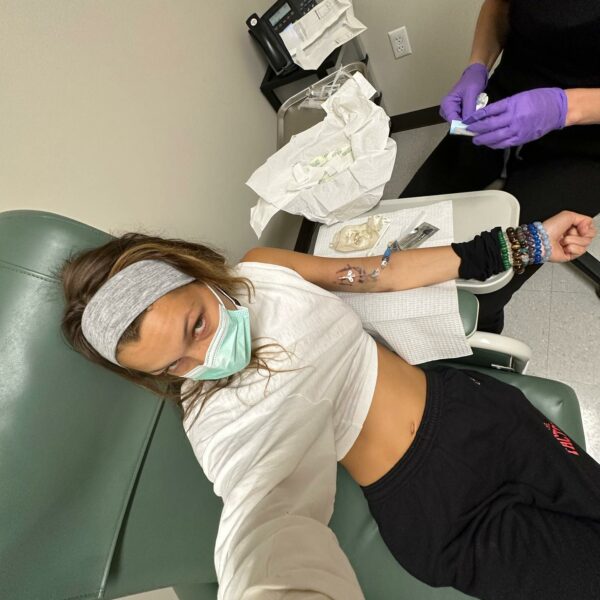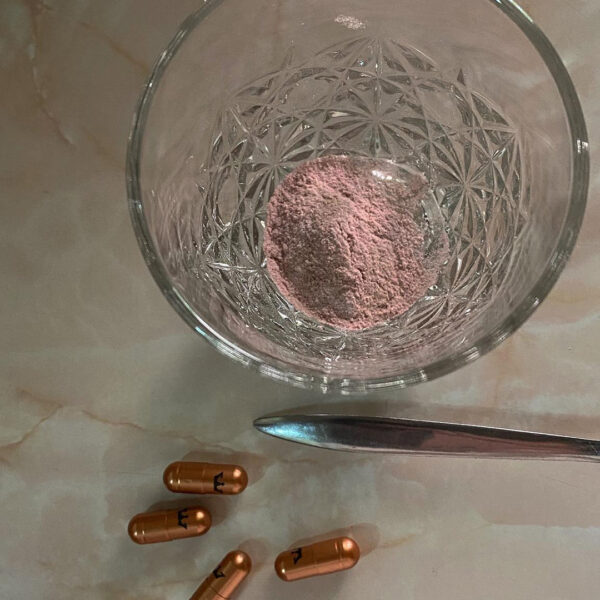The struggle to lose weight is, as we cheugy millennials like to say, REAL.
Sometimes it feels like we’re doing everything “right”—moving our bodies, eating well, working on our stress levels. And yet, the scale (or tape measure) refuses to budge.
W. T. F.
“Many times people have an undiagnosed health condition that causes them to store weight,” says Dr. Thaïs Aliabadi, board-certified women’s health expert and founder of Trimly, a virtual weight loss treatment designed for people in this situation.
“Every day, I see patients suffering from underlying conditions because their symptoms have not been taken seriously by their primary care physician or OB-GYN. These patients go from doctors to specialists, and they are told that they need to do a better job of diet and exercise,” she explains.
Le ugh.
Below, she breaks down 4 common underlying conditions that make it hard to lose weight.
Polycystic Ovary Syndrome (PCOS)
Symptoms: increased weight, irregular periods, acne, hair thinning, excessive hair growth in unwanted areas, skin tags, and more
This condition affects 20% of women around the world, often beginning during the teen years. “Sadly, these young women get so frustrated and depressed about their appearance, many develop eating disorders to ‘gain control’ of their situation.”
This typically occurs because PCOS can cause insulin resistance (which we’ll get to in the next section). It can also affect hunger-regulating hormones.
“The good news is that there are incredible medications available for people with PCOS and under the guidance of an experienced physician, they can start losing weight and feeling ‘normal’ again,” she adds.
Insulin Resistance
Symptoms: elevated blood sugar (which can lead to weight gain), increased hunger and thirst, headaches, blurred vision
“About one-third of adults in the United States are insulin resistant,” Dr. Aliabadi explains.
Around 45% of people aged 18-44 are insulin resistant.
“In simple terms, after eating sugar and carbohydrates, your pancreas secretes the insulin hormone to move glucose into cells where it is used for energy. If you have too much glucose, your body can’t process the sugar and stores it as fat. And fat disrupts your hormones,” she says.
“When you’re insulin resistant, glucose circulates freely throughout your body and gets stored as fat instead of being converted into energy,” she explains.
She notes that, similar to PCOS, medications are available to help with insulin resistance.
Endometriosis
Symptoms: chronic pain, inflammation, hormonal imbalance
This is a chronic condition where uterine-like tissue grows outside the uterus. It affects around 10% percent of women and girls worldwide. (That’s around 190 million people, FYI.)
Dr. Aliabadi explains that endometriosis can affect weight by causing “chronic, debilitating pain that makes physical activity challenging, leading to a more sedentary lifestyle and reduced calorie expenditure.”
It also causes an inflammatory response that can impact metabolism. “Hormonal imbalances, such as elevated estrogen levels or insulin resistance, may contribute to increased fat storage or difficulty losing weight. And, as if these patients don’t have enough to worry about, some hormonal treatments and pain relievers may have side effects that can influence weight,” she explains.
Being a woman is neat!
“As a physician, I see firsthand the toll that endometriosis takes on my patients, and I also see that it leads many to emotional eating patterns that negatively impact their weight,” she says.
Menopause
Symptoms: increased abdominal fat, hot flashes, mood swings, decline in metabolism
“Menopausal women often struggle with weight loss due to a combination of factors,” says Dr. Aliabadi.
“Hormonal changes from declining estrogen levels can affect the metabolism and fat distribution, leading to increased visceral or abdominal fat that is very difficult to lose,” she explains.
“Additionally, the metabolism’s decline due to age makes it harder to create a calorie deficit. Menopausal women may also experience muscle loss, which lowers their metabolic rate and reduces calorie expenditure. Symptoms such as hot flashes and mood swings can lead to increased stress, emotional eating, and decreased physical activity that further contributes to weight gain.
“We encourage a balanced diet, restful sleep, and other lifestyle modifications to help these women achieve their weight goals.”
If any of this sounds familiar to you, Dr. Aliabadi says not to be discouraged. “There are solutions out there, so please don’t give up. You must be persistent to find the right doctor with experience treating these types of conditions. Be your own advocate. It is my mission in life to bring awareness to these conditions that affect women worldwide.”
The content provided in this article is provided for information purposes only and is not a substitute for professional advice and consultation, including professional medical advice and consultation; it is provided with the understanding that Poosh, LLC (“Poosh”) is not engaged in the provision or rendering of medical advice or services. The opinions and content included in the article are the views of the author only, and Poosh does not endorse or recommend any such content or information, or any product or service mentioned in the article. You understand and agree that Poosh shall not be liable for any claim, loss, or damage arising out of the use of, or reliance upon any content or information in the article.
PCOS: can cause insulin resistance and affect hormones that regulate hunger
Insulin resistance: involves an improper cellular response to insulin that causes glucose to be converted into fat instead of energy
Endometriosis: causes uterine-like tissue to grow outside the uterus, which can cause chronic pain, inflammation, and hormonal imbalances that impact weight
Menopause: affects metabolism and fat distribution, which can lead to extra abdominal/visceral fat (a dangerous type of fat) and stressful symptoms like hot flashes that can lead to emotional eating
If any of this is familiar to you and you want to get checked out, take the time to find a doctor with experience treating these conditions, as they often go undiagnosed.
Up next, be the first to know our weekly content and sign up for our Poosh newsletter.




































